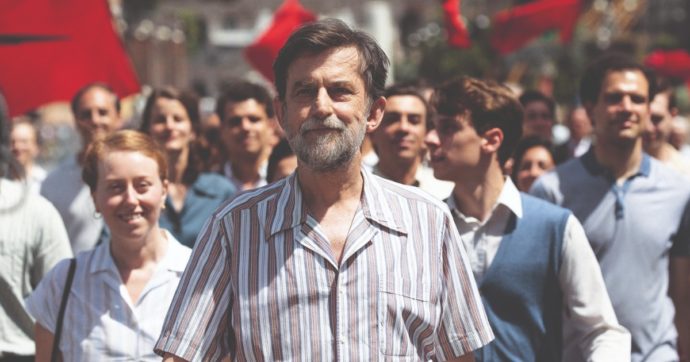Cannes: Nanni Moretti's "A Brighter Tomorrow"
 Friday, May 19, 2023 at 6:00PM
Friday, May 19, 2023 at 6:00PM Elisa Giudici reporting from Cannes...

It is not easy being coherent with your work when you have as strong moral compass as Nanni Moretti. The Italian director and Palm d’Or winner (The Son's Room, 2001) has built a career around his political beliefs and precise reading of reality. In Moretti’s world, everything is black or white, with some Communist Red. Compromising is surrendering to the enemy.
His new picture Il sol dell’avvenire (English title: A Brighter Tomorrow) is a tale of how difficult it is to be alive in a world in which everything you love and believe in is either dying or betraying you. It is a movie within a movie with a half dozen other movies tied up in it (for me, a certain Tarantino picture came to mind but more on that later). After the disappointing Tre Piani, Moretti returns to what he does best: playing a fictional version of himself on screen, and letting the mask slip when necessary to reveal his pain...
In A Brighter Tomorrow Moretti is Giovanni, a director who is overly attached to small rituals and big obsessions. Giovanni is shooting a movie set in ‘50 Rome, revolving around the time the Italian Communist Party decided to support the U.S.S.R. against protesters in Hungary.
Giovanni is petulant, a perfectionist and always eager to lecture others on set (just as with previous Moretti alter egos). At his side is Paola (Margherita Buy) his patient wife, and producer. Buy and Moretti's long story together on the screen helps make this relationship painful and cathartic to watch. A Brighter Tomorrow focuses on how desperately Moretti is trying to stay true to himself in a changing world that he has to embrace in some eway. In the movie, Giovanni wants to shoot a cheerful movie with memorable Italian songs about a happy married couple. It soon becomes apparent that this movie we're watching is that movie and one that's contemplating death, too.
As he moves from reality to the fictional lens of the film shoot, Moretti shows the cost of faithfulness: depression, solitude, and feeling abandoned by loved ones. In various scenes, he finds the existential crisis of cinema - as he knows and loves it - so unbearable that it causes the films to shift into a kind of dreaminess to survive. Moments where we see Giovanni playing soccer alone, happy, or when he leads everybody on set to dance to the notes of “Voglio vederti danzare” by Franco Battiato are like pure drops of cinematic vision. And cinema is the only way Moretti can face the harsh truth about his present tense.

As with Abbas Kiarostami’s Taste of Cherry, A Brighter Tomorrow revolves around the oppressive specter of death. However, it escapes it using cinema's ability to jump smoothly between realism and allegory. In one scene, Moretti instructs his lead actor (Silvio Orlando who has dreamt of playing "a character who kills himself by hanging”) for a key scene of the movie by putting his neck in the loop, on set. Moretti was betrayed by politics, and he sees a certain way to make movies dying. He can't do anything about it but he continues to believe in the strength of both politics and cinema. Given that, A Brighter Tomorrow will undoubtedly delight Moretti's most loyal fanbase. It's highly referential to his past films but sometimes it feels like the director is trying to meme himself for younger audiences.
Moretti is fighting back against a changing world in a familiar way: by critiquing his opponents with his forceful polemics. In order to overcome financial problems and finish the movie within this movie, Giovanni reluctantly agrees to meet with Netflix executives. During a surreal meeting, they ask him to "add a 'what the fuck' factor by minute 25", chanting as if possessed, "We are in over 190 countries”. That's a small convincing enough detail that it leads you to suspect that this meeting actually happened. In this one damning funny scene, Moretti reveals the mercenary soulessness of streaming algorithms.
There are new enemies to face, as well as some old ones to resist. A Brighter Tomorrow is also an update of Moretti’s strong beliefs about what to show and what not to show in a movie. One memorable scene revolves around unjustified violence is in today’s cinema. After seven minutes of arguing with a young, energetic director about an execution he is shooting, Nanni gives up, saying “You know what is the most frustrating detail here? You want to shoot this scene in this way because you want violence to be entertaining…and you enjoy it." It’s the same critique Moretti lauched against Kathryn Bigelow’s Strange Days in his 1998 film Aprile only the opponent is far less worthy this time.
For a director who is so against violence in movies, the following comparison will feel sacriligeous. Nevertheless, I cannot stop thinking about how similar aging Moretti and older Quentin Tarantino are. They embrace a “what if” scenario when necessary to make a preferred version of the world survive at least within their movie. They both fight to remain relevant in a cinematic landscape that's moved away from them (and not always for the better). Comparing this movie to Once upon a time… in Hollywood is like seeing two completely different people, speaking different languages, but trying desperately to say exactly the same thing.
A Brighter Tomorrow is playing in Competition at Cannes and has also opened in movie theaters in Italy.


